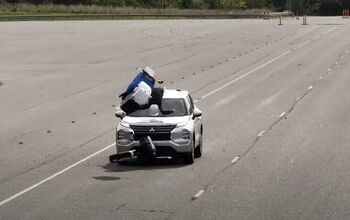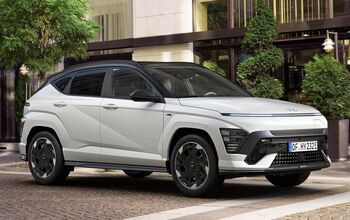Better Track Driving Through Technology

When the Traqmate system came out a decade or so ago, it revolutionized the way that low-and-mid-budget racers measured and improved their performance as drivers. All of a sudden it was possible to understand why you were faster or slower in a given situation. It’s now become such a standard that major sanctions like the Canadian Touring Car Championship use it to measure and adjust competitiveness across different chassis and engine combinations.
Last year, TTAC partnered with the people at Autosport Labs to test their Race/Capture system in our infamous race that wasn’t. Although somehow our RaceCapture system never returned from Texas, with all hands professing puzzlement about its ultimate disposition, I was able to use the RaceCapture prior to that race, in a coaching session with Chris Dyson and the Autosport Labs people. Using the system’s live-tracking features, I was able to immediately take ten seconds off my lap time in a single coaching session.
This year, Autosport Labs has a brand-new system and the spec sheet is enough to make a grown club racer shed a couple of tears in gratitude. There isn’t space to list everything that the new RC/2 does, but it’s capable of interfacing with your car to read engine data and tire temperature data in conjunction with your lap. Don’t know if it’s a problem with air-fuel ratio or aero drag slowing your acceleration on Mid-Ohio’s back straight? This system will tell you.
Using 50Hz GPS, the system promises to record to most accurate and consistent lap times yet — and as someone who suffered through a lot of trouble with the solid but fussy TrackMaster Android program at the Challenger Hellcat intro, I’d appreciate having better and more consistent GPS data.
Alright, this sounds like a sales pitch, and it is. Not necessarily for RaceCapture/2, but for any kind of high-quality data logging. You’ll learn more and progress faster as a track driver with solid data. Traqmate and RaceCapture are so good now that it’s possible to coach via e-mail — send me your data traces and I can probably offer a couple of ideas on how to go faster. The high-end private coaches like Peter Krause are doing all of their coaching now with observation and data. Why get in the right seat when you can make someone faster from the comfort of pit lane?
When RC/2 is in full production, we’ll be checking it out somewhere on the West Coast where we can generate some serious g-forces and hard numbers. If you can’t wait until, I’d recommend buying RaceCapture from Autosport Labs online — or checking out the pawnshops near College Station, TX.

More by Jack Baruth
Latest Car Reviews
Read moreLatest Product Reviews
Read moreRecent Comments
- W Conrad I'm not afraid of them, but they aren't needed for everyone or everywhere. Long haul and highway driving sure, but in the city, nope.
- Jalop1991 In a manner similar to PHEV being the correct answer, I declare RPVs to be the correct answer here.We're doing it with certain aircraft; why not with cars on the ground, using hardware and tools like Telsa's "FSD" or GM's "SuperCruise" as the base?Take the local Uber driver out of the car, and put him in a professional centralized environment from where he drives me around. The system and the individual car can have awareness as well as gates, but he's responsible for the driving.Put the tech into my car, and let me buy it as needed. I need someone else to drive me home; hit the button and voila, I've hired a driver for the moment. I don't want to drive 11 hours to my vacation spot; hire the remote pilot for that. When I get there, I have my car and he's still at his normal location, piloting cars for other people.The system would allow for driver rest period, like what's required for truckers, so I might end up with multiple people driving me to the coast. I don't care. And they don't have to be physically with me, therefore they can be way cheaper.Charge taxi-type per-mile rates. For long drives, offer per-trip rates. Offer subscriptions, including miles/hours. Whatever.(And for grins, dress the remote pilots all as Johnnie.)Start this out with big rigs. Take the trucker away from the long haul driving, and let him be there for emergencies and the short haul parts of the trip.And in a manner similar to PHEVs being discredited, I fully expect to be razzed for this brilliant idea (not unlike how Alan Kay wasn't recognized until many many years later for his Dynabook vision).
- B-BodyBuick84 Not afraid of AV's as I highly doubt they will ever be %100 viable for our roads. Stop-and-go downtown city or rush hour highway traffic? I can see that, but otherwise there's simply too many variables. Bad weather conditions, faded road lines or markings, reflective surfaces with glare, etc. There's also the issue of cultural norms. About a decade ago there was actually an online test called 'The Morality Machine' one could do online where you were in control of an AV and choose what action to take when a crash was inevitable. I think something like 2.5 million people across the world participated? For example, do you hit and most likely kill the elderly couple strolling across the crosswalk or crash the vehicle into a cement barrier and almost certainly cause the death of the vehicle occupants? What if it's a parent and child? In N. America 98% of people choose to hit the elderly couple and save themselves while in Asia, the exact opposite happened where 98% choose to hit the parent and child. Why? Cultural differences. Asia puts a lot of emphasis on respecting their elderly while N. America has a culture of 'save/ protect the children'. Are these AV's going to respect that culture? Is a VW Jetta or Buick Envision AV going to have different programming depending on whether it's sold in Canada or Taiwan? how's that going to effect legislation and legal battles when a crash inevitibly does happen? These are the true barriers to mass AV adoption, and in the 10 years since that test came out, there has been zero answers or progress on this matter. So no, I'm not afraid of AV's simply because with the exception of a few specific situations, most avenues are going to prove to be a dead-end for automakers.
- Mike Bradley Autonomous cars were developed in Silicon Valley. For new products there, the standard business plan is to put a barely-functioning product on the market right away and wait for the early-adopter customers to find the flaws. That's exactly what's happened. Detroit's plan is pretty much the opposite, but Detroit isn't developing this product. That's why dealers, for instance, haven't been trained in the cars.
- Dartman https://apnews.com/article/artificial-intelligence-fighter-jets-air-force-6a1100c96a73ca9b7f41cbd6a2753fdaAutonomous/Ai is here now. The question is implementation and acceptance.


































Comments
Join the conversation
Robert Farago, Ed Niedermeyer, Bertel Schmitt, Jack Baruth: all of them made TTAC great and a joy to read, each in their own personal style. But right now, TTAC has become soulless. It is just a list of articles now. It always was more than just that. Bring back Baruth!
Mr. Baruth, sir - I will happily volunteer the use of my Formula Ford (SoCal based) for a test-day with one of these systems. I've used laptimers for years, but have always felt like a little more data would help a LOT. This is my next big purchase for the car...